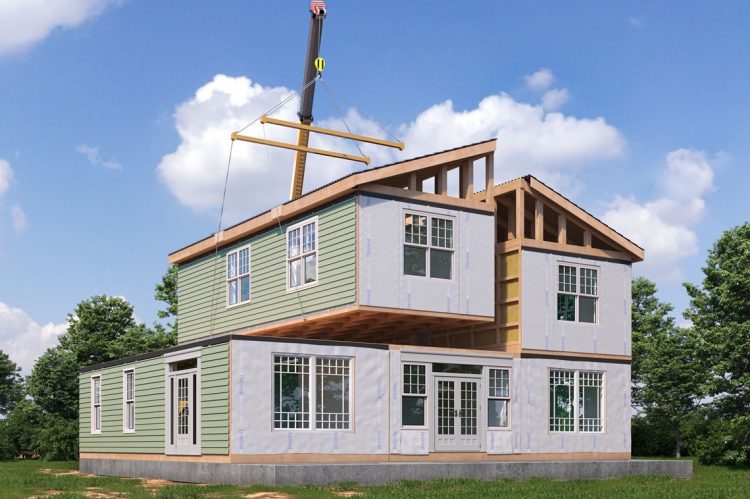Built in sections at a factory and assembled on-site, modular homes offer a unique blend of efficiency and customization.
Their popularity stems from their ability to provide affordable, durable and sustainable housing options. We will examine the various benefits of modular homes and highlight why they are becoming a preferred choice for many.
If you are considering buying new construction, you may want to check out their options. Modular homes offer a compelling alternative to traditional builds, from construction speed to environmental advantages.
From years of experience as a REALTOR®, I remember there was a time when modular homes were thought of as being inferior. I had many buyers who would not even consider purchasing modular construction. A lot has changed in that time. They are now a popular housing option.
A few of my clients have opted for them in recent years.
Let’s explore why modular housing is of growing interest and how it caters to homeowners’ evolving needs.
What are modular homes?
Modular homes redefine modern living with their innovative construction process. Unlike traditional homes, builders construct modular homes in factories in sections.
They then transport these sections to the building site, assembling them into a complete house. This method has gained traction for its efficiency, sustainability and cost-effectiveness.
There are many things to know about modular home construction that potential homebuyers and real estate agents should know. Maximum Real Estate Exposure does an excellent job of summing up essential facts.
Advantages of modular homes
There are many benefits to modular housing. Let’s look into each of the advantages carefully:
Construction speed
Modular homes are built quickly. Factories produce sections in parallel, significantly cutting down construction time. This efficiency allows homeowners to close much sooner than they would with traditional home construction.
Speed does not compromise quality but enhances the overall construction process. From a REALTOR®’s standpoint, it is always great not to go through the typically arduous process of a typical building project.
Less waste production
The manufacturing process for modular homes generates less waste. Factories use precise measurements and controlled conditions to minimize offcuts and unused materials. This not only reduces the environmental impact but also contributes to the cost-effectiveness of these homes.
Energy efficiency
Modular homes excel in energy efficiency. Their construction includes tight seals and better insulation, lowering energy consumption. This efficiency benefits the environment and results in lower utility bills for homeowners.
Energy-efficient appliances and systems often complement the design, enhancing the home’s sustainability.
Cost-effectiveness
Lower average costs
On average, modular homes cost less than traditional ones. Factory production efficiencies lower overall expenses, making homeownership more attainable for many people without sacrificing quality or design.
Predictable pricing
With modular homes, pricing is upfront and predictable. There are no surprises. This clarity helps buyers budget effectively. It makes financial planning smoother and more reliable than conventional construction projects.
Reduced labor costs
Labor costs for modular homes are lower, thanks to the factory setting. Fewer on-site workers are needed, and the faster construction timeline reduces labor hours. This efficiency translates into direct cost savings for the homeowner.
Quality and durability
Controlled manufacturing environment
The factory setting for modular homes ensures a consistent, controlled environment. This control results in uniform quality and adherence to building codes.
Homeowners benefit from high standards that are not always guaranteed in traditional construction.
Rigorous quality standards
Modular homes undergo strict inspections and quality checks at each production stage. These rigorous standards often exceed those for traditional homes, providing homeowners with a sense of security and trust in the durability of their investment.
Longevity and resilience
Designed to withstand transport, modular homes boast exceptional structural strength. They frequently surpass the durability of site-built homes, offering enhanced resistance to environmental stresses.
Buyers enjoy the longevity and low maintenance that modular homes provide. Many buyers are having an excellent home-building experience with this type of construction.
Flexibility and customization
Wide range of design options
Modular homes offer a wide array of design possibilities. They suit any preference, from sleek, modern aesthetics to traditional styles. This flexibility ensures that every homeowner finds the perfect match for their taste.
Ability to expand or modify
The modular nature of these homes makes future expansions or modifications straightforward. You can easily add or rearrange modules to accommodate changing needs, making these homes adaptable for as long as you own the property.
Personalization to homeowner’s preferences
Customization is a hallmark of modular homes. Buyers select layouts, finishes and features that reflect their style. This level of customization makes each modular home unique and tailored to the owner’s preferences and lifestyle.
Flexibility and customization highlight modular homes’ adaptability and personalization capabilities, making them versatile for diverse needs and preferences.
Conclusion
There are many things to know before buying a new house, whether modular or traditional. Do plenty of research before committing.
Modular homes offer many benefits that cater to the modern homeowner’s needs. They combine efficiency and sustainability with cost-effectiveness without compromising on quality or durability. The construction process saves time, reduces waste and ensures homes are energy-efficient and affordable.
Quality and durability are paramount, with strict standards and a controlled manufacturing environment that surpasses traditional construction methods.
The flexibility and customization options allow homeowners to create spaces that reflect their style and adapt to their changing needs.
As the housing market evolves, modular homes may stand out to buyers as an innovative, sustainable choice that brings together efficiency, affordability and customization converge.












